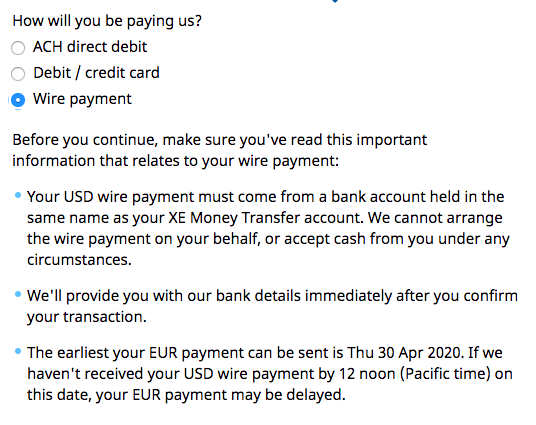07-05-2020 | treasuryXL | XE |
One of the most common questions XE receives is, “How long does a money transfer take?” As much as XE wish they could immediately come back with a definitive answer, there’s no one-size-fits-all answer for the length of time between you hitting “Confirm transaction now” and your money transfer arriving at its destination.

In general, your transfer will be completed within 1-4 business days. The reason for this range is because no two transfers are alike, and the details of your transfer—such as how you’re paying, where you’re sending your money, and the currencies you want to exchange—can all impact the length of your transfer.
Who is Transferring
XE requires you to provide additional documentation before you can make a money transfer. If they need this information from you, don’t worry: they will reach out to you by email to let you know what they need from you.
If you get this email: all you need to do is log into your account, click “Upload Documents”, and upload a copy of your passport, driver’s license, or national ID.

It should only take a few minutes, and we’ll let you know as soon as you’re good to go.
Where You’re Transferring
Where you’re sending your money could also have an impact. You won’t need to account for the physical distance your money is traveling (money transfer is a transfer of information), but there’s no guaranteeing how quickly your recipient’s bank can process the transfer, whether your transfer will need to travel through an additional intermediary institution, or what kind of payment method your destination might require. All of these could affect how long it takes to complete your transfer.
When You’re Transferring
You can initiate a money transfer online or in the app 24/7, 365 days a year. However, because money transfers typically run through banks and other financial institutions, they will be privy to these institutions’ working hours. So if you initiate your transfer late at night or on a bank holiday, you might see a small delay.
And it’s not just the banks: check the calendar for your destination as well. National holidays can affect your transfers in addition to bank limitations.
How You’re Paying For Your Transfer
There are three ways you can provide the money for your money transfer: credit or debit card, wire transfer, or ACH payment. The time to receive these payments will vary: both card payments and wire transfers are quick, and typically get your money to use within 24 hours. ACH payments can take a little longer to settle due to the number of parties involved in the payment.
What’s important to remember is that your payment and transfer date will not be kept secret. When you initiate a transfer, we’ll let you know the soonest possible date we can send your transfer.
Here’s what you’d see if you attempted to initiate a money transfer on April 29, at about 5:00 in the evening:
ACH Direct Debit

Wire Transfer

Credit or Debit Card Payment

Even after you’ve confirmed your transfer, XE will still be in touch. They will let you know by email when your transfer has been sent as well as when it’s arrived with its recipient. No matter what, when, where, and how you’re making your money transfer, XE provides you with the best simple, secure, and smooth experience.
Get in touch with XE.com
About XE.com
XE can help safeguard your profit margins and improve cashflow through quantifying the FX risk you face and implementing unique strategies to mitigate it. XE Business Solutions provides a comprehensive range of currency services and products to help businesses access competitive rates with greater control.
Deciding when to make an international payment and at what rate can be critical. XE Business Solutions work with businesses to protect bottom-line from exchange rate fluctuations, while the currency experts and risk management specialists act as eyes and ears in the market to protect your profits from the world’s volatile currency markets.
Your company money is safe with XE, their NASDAQ listed parent company, Euronet Worldwide Inc., has a multibillion-dollar market capitalization, and an investment grade credit rating. With offices in the UK, Canada, Europe, APAC and North America they have a truly global coverage.
Are you curious to know more about XE?
Maurits Houthoff, senior business development manager at XE.com, is always in for a cup of coffee, mail or call to provide you detailed information.

Visit XE.com
Visit XE partner page
Source










